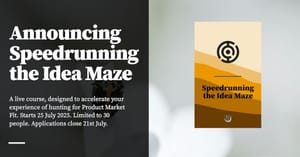I have two announcements today.
The first requires a wee bit of setup. About two years ago, I stumbled onto Naturalistic Decision Making (NDM) researcher Lia DiBello’s work on the expertise of business. A summary of her findings was tucked away in a chapter of The Oxford Handbook of Expertise, which I’d bought on a lark. And what DiBello and her collaborators had discovered was extremely compelling: all good businesspeople, regardless of industry, share the same mental model of business. Sure, the specifics of this model vary from industry to industry, but the structure of the expertise remains the same.
For anyone who is familiar with the NDM approach to expertise, this should set off alarm bells in your head. Having an explicated model of expertise is extremely useful: for starters, it means that you may use the model as a guide for training, or perhaps for self improvement. (NDM researchers routinely use extracted tacit models of expertise to construct simulations, in order to accelerate expertise). But the model is useful in other ways: for instance, if you know what business expertise looks like, you can recognise when someone is good at business, and perhaps identify when they are not.
I dug into the majority of her work in the members-only Business Expertise Series over the course of 2021. I reserved that writing for members, mostly because I thought it was such a powerful tool. But as of yesterday, I’ve removed the paywall; the series is now free for everyone to read.
Why did I do so? The short answer is that I want to organise much of Commoncog around DiBello’s model of business expertise; in order to do so I need readers to be familiar with the model. This leads me to my second announcement.
Commoncog has two new ‘topic overview’ pages: one for Business Expertise, and one for Expertise Acceleration in general. The Business Expertise page explains DiBello’s findings, and then links out to the three legs of the business expertise triad: Operations, Market and Capital. You may visualise it somewhat with the following hierarchy:
Business Expertise→
Commoncog's approach to business expertise is built on a extracted mental model of business expertise. Read on to learn what that means.
Operations→
Articles related to running your business better. This broadly covers org design, better management, operational rigour, becoming data driven and related topics.
Market→
Articles related to strategy, understanding your customers, and beating the competition.
Capital→
Articles related to capital structure, cash flow, unit economics and other financial nonsense.
Expertise Acceleration→
Commoncog's approach to expertise acceleration is to look at the best research methods known to us today, and then to test these methods through in practice.
With this redesign, Commoncog’s site organisation is hopefully more coherent; you should be able to see the site’s themes the way I see it when I’m writing or investigating particular aspects of business expertise. I also plan to update the topic overviews over time. This way, readers should always be able to reorient themselves in the topic landscape when catching up on Commoncog’s latest posts (or so I hope!)
There is one minor, final change. Individual Commoncog posts will now have a banner up top, indicating which topic cluster the article belongs to. Not every article will have a banner, mind — most of Commoncog’s early essays do not belong to any of the above topic clusters. But nearly all recent publications belong to one or more of the above topics; you should see a variety of colours as you browse.
Why is this so important to highlight? The truth is that DiBello’s work has been a huge influence on this blog. Discovering her work and researching that series changed the direction of my writing over the course of 2021. About a year later, at the end of 2022, I wrote that Commoncog’s writing has now solidified around a) business expertise, and b) training methods to accelerate the acquisition of that expertise. And indeed this has been the case. You can sort of squint and see the direction of my obsession with my summary of Accelerated Expertise, which in turn led to my digging into Cognitive Transformation Theory (how experts learn from trial and error), and more recently my deep dive into Cognitive Flexibility Theory (why experts in ill-structured domains reason from cases instead of abstract frameworks). DiBello’s work has also indirectly resulted in my experiments with the Commoncog Case Library, and has played a small part in my experiments with deliberate practice. Finally, nearly everything I’ve written about business in the past two years has slotted in neatly with DiBello’s triad mental model of business expertise.
So it’s time to set that original series free.
I’ll have more updates to announce regarding Commoncog’s offerings soon. But as a short teaser:
- I’m wrapping up the Becoming Data Driven Series — before going into an enforced break as I put the ideas in the series to practice.
- I’m starting work on the next phase of the Commoncog Case Library.
- I’ll spend a small amount of time writing on the conglomerates question that I promised in my 2022 recap.
See you soon.
Originally published , last updated .





